Module6 Hobbies 外研版八年级英语下册复习课件 (共41张PPT)
文档属性
| 名称 | Module6 Hobbies 外研版八年级英语下册复习课件 (共41张PPT) |
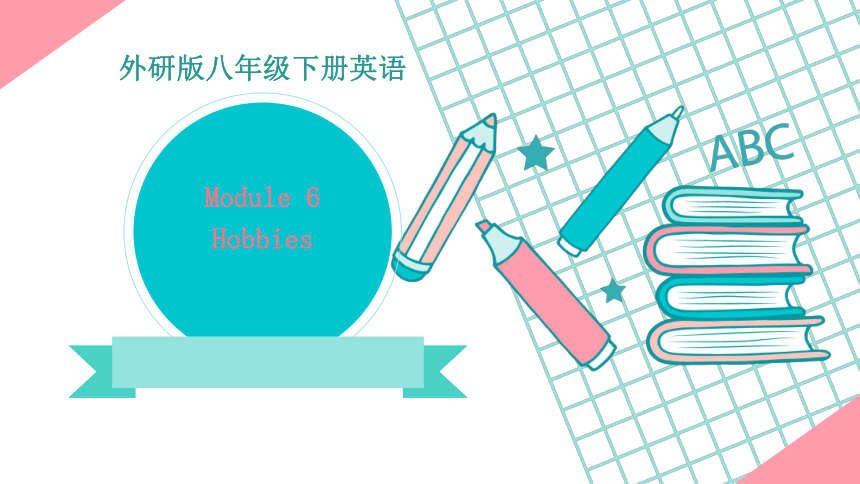
|
|
| 格式 | zip | ||
| 文件大小 | 11.0MB | ||
| 资源类型 | 教案 | ||
| 版本资源 | 外研版 | ||
| 科目 | 英语 | ||
| 更新时间 | 2020-07-01 00:00:00 | ||
图片预览

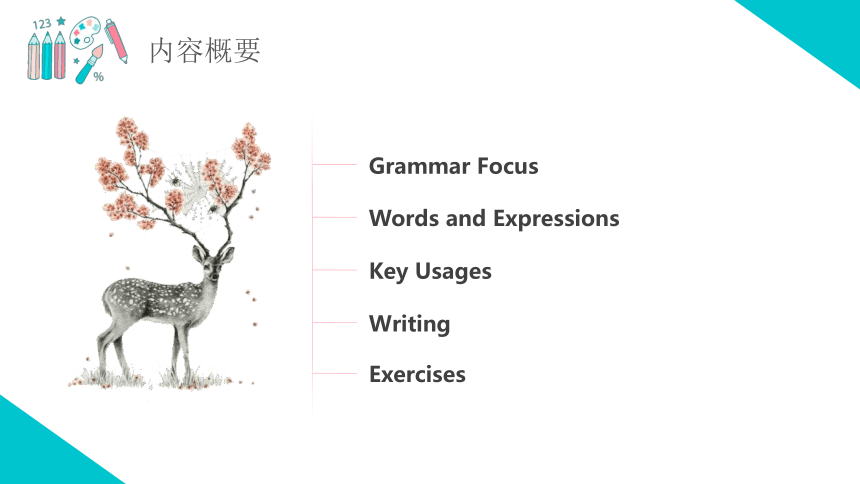
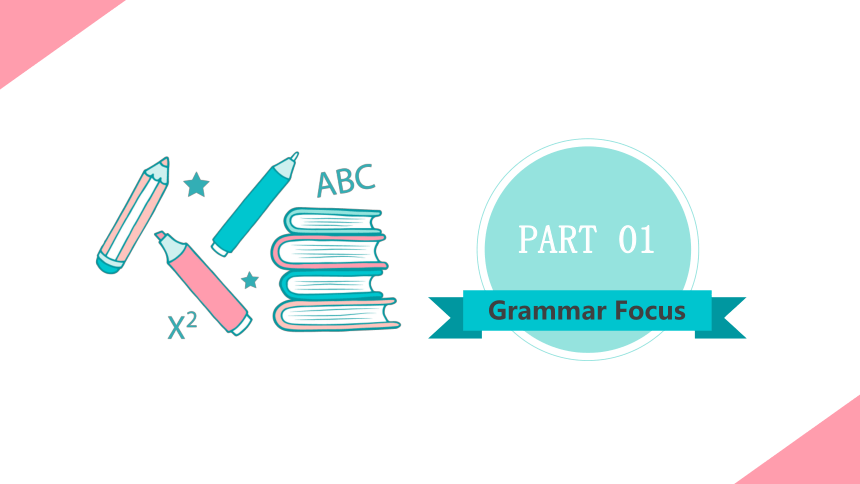

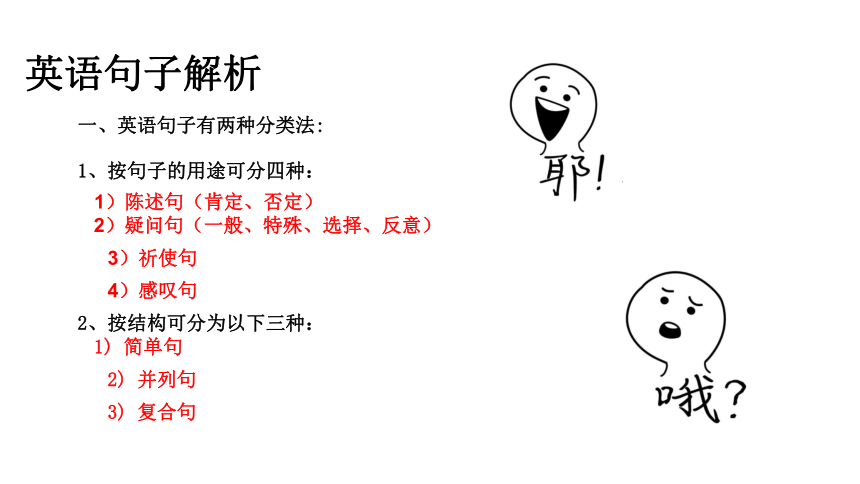
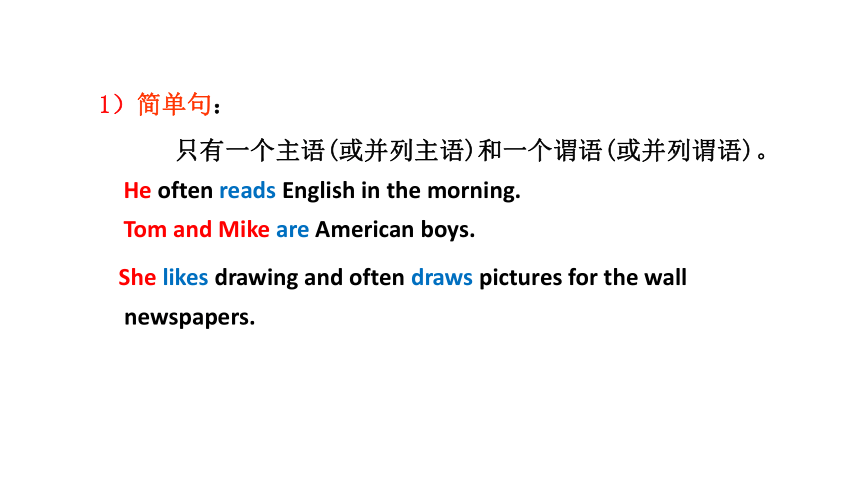
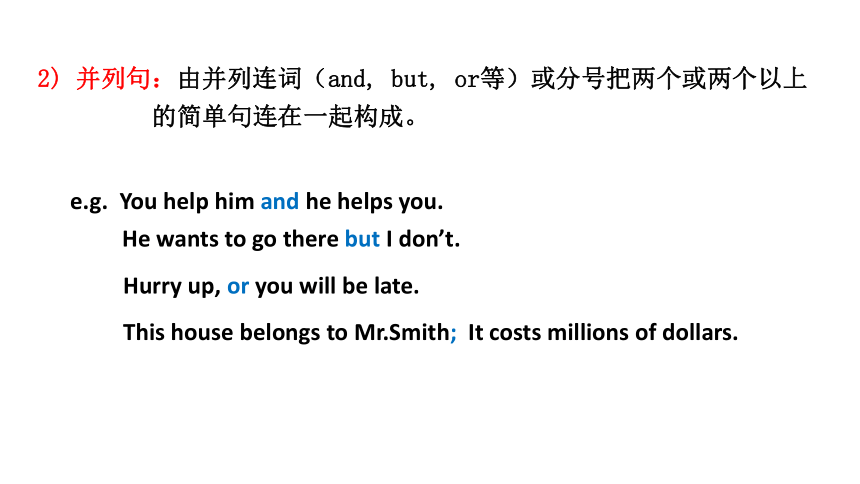
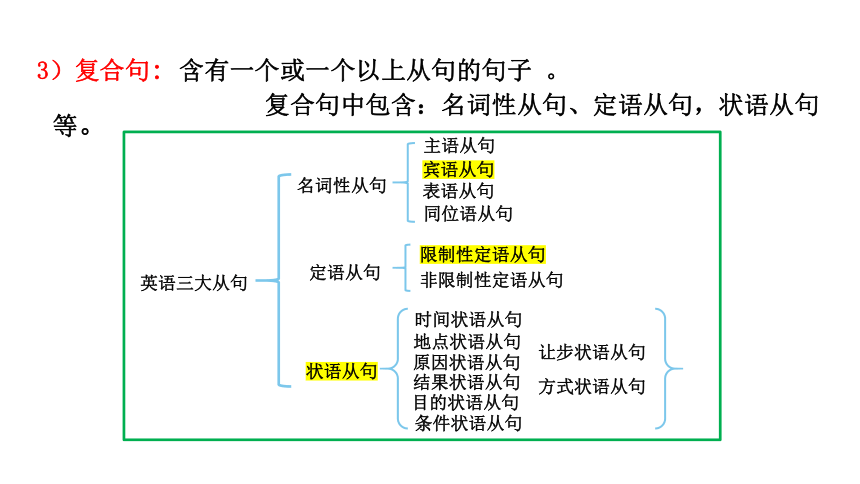
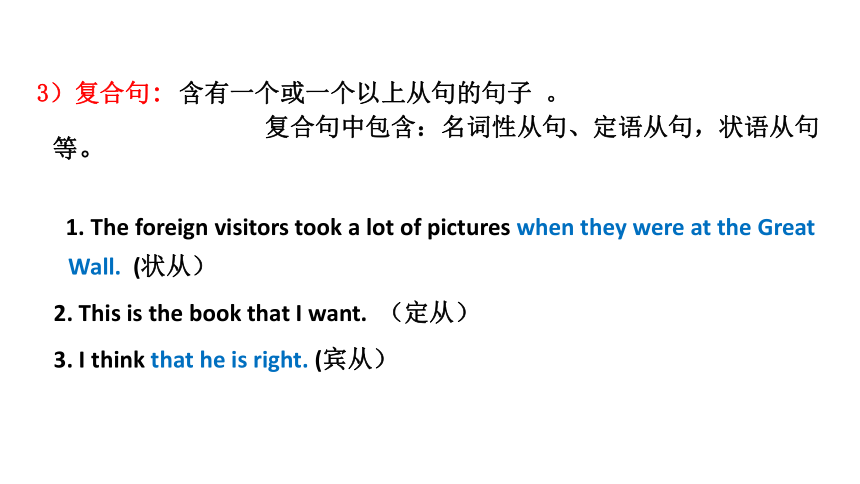
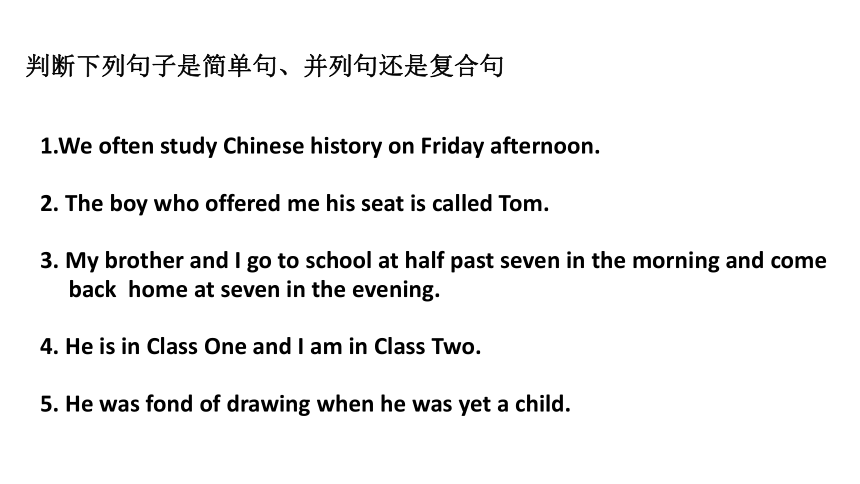
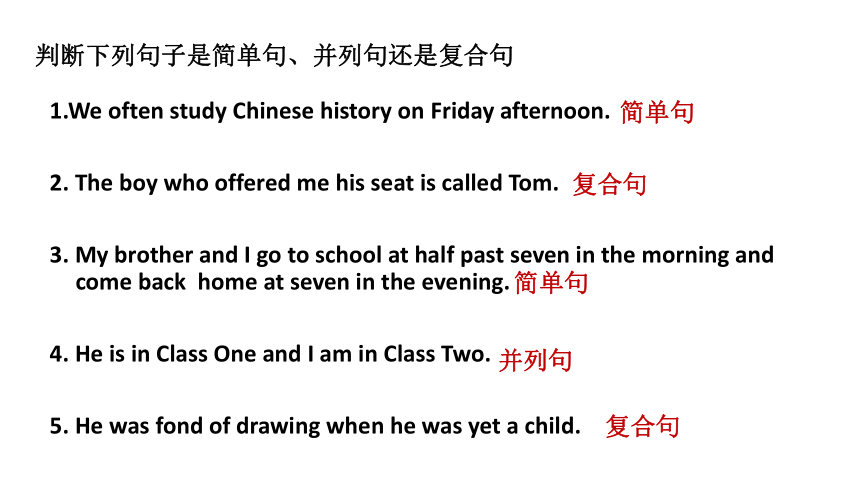
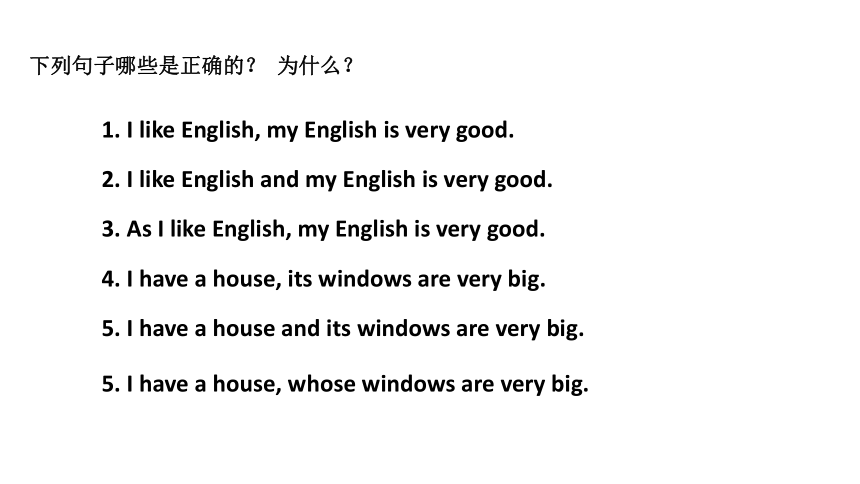
文档简介
(共41张PPT)
外研版八年级下册英语
Module
6
Hobbies
Grammar
Focus
Words
and
Expressions
Key
Usages
Writing
Exercises
内容概要
Grammar
Focus
PART
01
简单句的基本句型
英语句子解析
一、英语句子有两种分类法:
1、按句子的用途可分四种:
1)陈述句(肯定、否定)
2)疑问句(一般、特殊、选择、反意)
3)祈使句
4)感叹句
2、按结构可分为以下三种:
1)
简单句
2)
并列句
3)
复合句
1)简单句:
只有一个主语(或并列主语)和一个谓语(或并列谓语)。
He
often
reads
English
in
the
morning.
Tom
and
Mike
are
American
boys.
She
likes
drawing
and
often
draws
pictures
for
the
wall
newspapers.
2)
并列句:由并列连词(and,
but,
or等)或分号把两个或两个以上的简单句连在一起构成。
e.g.
You
help
him
and
he
helps
you.
?
He
wants
to
go
there
but
I
don’t.
Hurry
up,
or
you
will
be
late.
This
house
belongs
to
Mr.Smith;
It
costs
millions
of
dollars.
3)复合句:
含有一个或一个以上从句的句子
。
复合句中包含:名词性从句、定语从句,状语从句等。
英语三大从句
名词性从句
定语从句
状语从句
主语从句
宾语从句
表语从句
同位语从句
限制性定语从句
非限制性定语从句
时间状语从句
地点状语从句
原因状语从句
结果状语从句
目的状语从句
条件状语从句
让步状语从句
方式状语从句
3)复合句:
含有一个或一个以上从句的句子
。
复合句中包含:名词性从句、定语从句,状语从句等。
1.
The
foreign
visitors
took
a
lot
of
pictures
when
they
were
at
the
Great
Wall.
(状从)
2.
This
is
the
book
that
I
want.
(定从)
3.
I
think
that
he
is
right.
(宾从)
判断下列句子是简单句、并列句还是复合句
1.We
often
study
Chinese
history
on
Friday
afternoon.
2.
The
boy
who
offered
me
his
seat
is
called
Tom.
3.
My
brother
and
I
go
to
school
at
half
past
seven
in
the
morning
and
come
back
home
at
seven
in
the
evening.
4.
He
is
in
Class
One
and
I
am
in
Class
Two.
5.
He
was
fond
of
drawing
when
he
was
yet
a
child.
判断下列句子是简单句、并列句还是复合句
1.We
often
study
Chinese
history
on
Friday
afternoon.
2.
The
boy
who
offered
me
his
seat
is
called
Tom.
3.
My
brother
and
I
go
to
school
at
half
past
seven
in
the
morning
and
come
back
home
at
seven
in
the
evening.
4.
He
is
in
Class
One
and
I
am
in
Class
Two.
5.
He
was
fond
of
drawing
when
he
was
yet
a
child.
简单句
复合句
简单句
并列句
复合句
下列句子哪些是正确的?
为什么?
1.
I
like
English,
my
English
is
very
good.
2.
I
like
English
and
my
English
is
very
good.
3.
As
I
like
English,
my
English
is
very
good.
4.
I
have
a
house,
its
windows
are
very
big.
5.
I
have
a
house
and
its
windows
are
very
big.
5.
I
have
a
house,
whose
windows
are
very
big.
下列句子哪些是正确的?
为什么?
1.
I
like
English,
my
English
is
very
good.
2.
I
like
English
and
my
English
is
very
good.
3.
As
I
like
English,
my
English
is
very
good.
4.
I
have
a
house,
its
windows
are
very
big.
5.
I
have
a
house
and
its
windows
are
very
big.
5.
I
have
a
house,
whose
windows
are
very
big.
二、简单句的五种基本句型
1、主语+不及物动词:(
主谓)
e.g.
We
work.
She
came
just
now.
They
went.
常见的不及物动词:
come
go
work
walk
swim
arrive
stay
laugh
happen
2
、主语+系动词+表语:(主系表)
系动词分类
一?be动词类:
am、?is?、are?、was?、were?
二表示变化类:
become、?get?、?turn?、?grow?、go
三感官动词类:?look?、sound
、smell、taste
、feel
四延续性动词类:
remain、stay、keep
五似乎好像:
seem、appear
1.
He
is
a
student
2.
That
sounds
good.
3.
The
apple
tastes
sweet.
4.
They
become
rich.
3、主语+及物动词+宾语:(主谓宾)
Henry
bought
a
dictionary.
Mike
ate
three
cakes.
She
drew
a
beautiful
picture.
He
want
to
dream
a
nice
dream.
You
can
do
what
you
want
to
do.
I
didn’t
mind
opening
the
door.
4、主语+谓语(及物动词)+双宾语(间接宾语+直接宾语)
My
father
bought
me
a
car.
=
My
father
bought
a
car
for
me.
He
gave
me
three
yuan.
=
He
gave
three
yuan
to
me.
及物动词
(双宾动词)
give,
offer,
lend,
send,
pass,
show,
bring,
take,
sell,
write,
buy,
fetch,
find,
get,
make
初中阶段常见的双宾动词用法有:
bring/send/give/take通常加
to
sb.
buy/make/cook/sing/draw通常加
for
sb.
5、主语+谓语(及物动词)+复合宾语(宾语+宾补)
We
made
the
baby
laugh./happy.
I
heard
him
sing.
I
saw
him
dance.
I
found
the
book
interesting.
We
call
him
Tom.
His
father
named
him
Tom.(叫,称呼)
英语简单句五大基本句型
一、主语+谓语动词
(S+Vi)
The
sun
is
rising.
二、主语+谓语动词+宾语
(S+Vt+O)
I
like
swimming.
三、主语+谓语动词+间接宾语+直接宾语(S+Vt+IO+DO)
He
handed
me
a
letter.
He
handed
a
letter
to
me.
四、主语+谓语动词+宾语+宾语补
(S+Vt+O+OC)
He
found
his
new
job
boring.
五、主语+系动词+表语
(S+Link.V+P)
Mr.
Brown
is
an
engineer.
Words
and
Expressions
PART
02
fan
stamp
shelf
as
coin
note
pound
dollar
must
valuable
value
n.
扇子
n.
邮票
n.
隔板,架子
prep.
当作
n.
硬币
n.
纸币
n.
英镑
n.
美金
必须
adj.
有价值的
n.价值
just
person
interest
skill
activity
sailing
result
pleasure
success
have
a
look
come
out
as
a
result
adv.
仅仅,只是
n.
人
n.
兴趣;爱好
n.
技能;技艺
n.
活动
n.
航海;航行
n.
结果
n.
愉悦;快乐
n.
成功;成就
看一下
出版;发行
结果
1.
a
little
+
不可数名词:有点儿、少量的
e.g.
There
is
only
a
little
meat
in
the
fridge.
a
bit
of
+
不可数名词:有点儿、少量的
e.g.
I
need
a
bit
of
water.
2.
have
a
look:看一看,后跟宾语时,要加介词at.
e.g.
have
a
look
at
=
look
at
Have
a
look
at
the
picture.
=
Look
at
the
picture.
3.
most
of
+
代词宾格
或
most
of
+
限定词
+
名词作主语时,谓语动词的数由most后面的代词或名词决定。
e.g.
Most
of
my
storybooks
are
very
interesting.
Most
of
us
like
English.
Most
of
her
money
was
stolen.
她的大部分钱被偷了。
4.
must:表示肯定的推测,“一定、肯定”。表示否定的推测时用can’t,
“不可能”。
e.g.
The
restaurant
must
be
very
good.
It’s
always
full
of
people.
That
girl
can’t
be
Lily.
Lily
is
much
taller.
5.
as
+
形容词/
副词的原级
+
as
:
和……一样
e.g.
His
English
is
as
good
as
mine.
He
drives
as
well
as
his
father.
6.
用:
1)
with:用具体有形的东西(工具)
e.g.
I
write
a
letter
with
a
pen.
2)
in:用语言、声音、原材料
e.g.
Can
you
speak
in
a
loud
voice?
3)
by:用/
通过……用段或方式
e.g.
The
girl
made
money
by
selling
flowers.
7.
1)
some……others……:一些……另一些……
e.g.
Some
students
like
watching
TV
and
others
like
going
online.
2)
one
……the
other……:一个……,另一个……(范围是两者)
e.g.
There
are
only
two
students
in
the
classroom.
One
is
reading
and
the
other
is
drawing.
I
have
two
pens.
One
is
red
and
the
other
is
black.
8.
develop:
v.
培养、提高、发展、形成、长大
e.g.
This
lesson
will
help
you
develop
your
writing
skills.
这节课有助于提高你的写作能力。
We
should
develop
good
living
habits.
我们应该养成好的生活习惯。
9.
as
well
as:除了……外(还有),可用besides代替。
e.g.
I
have
a
few
English
books
as
well
as
/
besides
this
.
I
study
Japanese
as
well
as
English.
除了英语外,我还学日语。
10.
encourage
sb.
to
do
sth.:
鼓励某人做某事
e.g.
My
parents
always
encourage
me
to
study
hard.
11.
come
out:
出版、发行、(花儿)开放、出来
e.g.
When
will
his
new
book
come
out?
Spring
comes
and
the
flowers
start
to
come
out.
The
result
will
come
out
three
days
later.
12.
as
a
result
=
so
结果、因此、
e.g.
She
didn’t
study
hard
and
as
a
result,
she
didn’t
pass
the
exam.
Tom
studied
hard.
As
a
result,
he
passed
the
exam.
13.
success
n.
成就、成功
e.g.
Failure
is
the
mother
success.
失败乃成功之母。
successful
adj.
成功的
successfully
adv.
成功地
succeed
v.
成功
e.g.
He
finished
the
work
successfully.
He
is
a
successful
writer.
Don’t
give
up.
You
know
hard
work
leads
to
success.
He
succeeded
in
finishing
the
work
at
last.
他终于成功完成了那项工作。
Key
Usages
PART
03
I
collected
coins
and
notes,
you
know,
like
British
pounds
and
US
dollars.
…我收集硬币和纸币,你知道,比如英镑和美元。
notes表示“纸币”,为复数形式,其单数形式是note.
e.g.
Have
you
read
the
book
One
Million
Pound
Note
by
Mark
Twain?
notes
还可以表示“记录,笔记”一般只用复数形式。
e.g.
Take
notes
on
the
important
points
while
you
are
listening.
听的时候把重点记录下来。
develop:
发展,形成,成长,提高
e.g.
This
course
can
help
you
develop
your
speaking
skills.
这门课程可以帮助你提高口头表达能力。
Tom
has
developed
into
a
strong
leader.
汤姆已经成长为一名强有力的领导人。
I
developed
a
taste
for
classical
music
when
I
was
in
high
school.
我中学的时候开始喜欢上古典音乐。
Hobbies
can
make
you
grow
as
a
person,
develop
your
interests
and
help
you
learn
new
skills.
爱好可以促使你橙子,培养你的兴趣,并帮助你学习新的技能。
As
well
as
the
usual
activities,
such
as
sailing
and
climbing,
there
was
a
writing
class.
除了像帆船运动和爬山这样常见的活动以外,还有一门写作课程。
as
well
as
:
也,还,而且
e.g.
We
all
want
to
visit
Beijing
as
well
as
Shanghai.
I
spend
some
of
my
free
time
playing
volleyball
for
my
school
team.
我花了一部分业余时间在校队打排球。
spend
time
(in)
doing
sth
花时间做某事
介词in可以省略;
如果要表示“在某物上花费时间”,用句型
spend
time
on
sth.
e.g.
I
spend
one
hour
(in)
reading
every
evening。
我每天晚上花一小时来读书。
Julia
hasn’t
spent
enough
time
on
her
child.
茱莉亚在孩子身上花的时间不够。
Writing
PART
04
话题写作:
请以
My
hobbies
为题写一篇短文。
范文:
My
Hobbies
I
have
many
hobbies,
such
as
sports,
singing,
playing
the
violin
and
keeping
a
diary.
At
school,
I
often
hear
the
PE
teacher
say
sports
are
good
for
our
health
and
will
make
us
live
longer.
So
I
like
sports
very
much.
I
go
running
at
five
o’clock
in
the
afternoon.
I
play
table
tennis
with
my
friends.
These
sports
have
kept
me
healthy.
At
home,
I
like
singing
and
playing
the
violin.
I
hope
I
will
be
a
singer
and
violinist
when
I
grow
up.
In
order
to
reach
these
goals,
I
go
to
the
teacher’s
home
for
a
lesson
every
Saturday
and
practice
singing.
Of
all
my
hobbies,
I
like
reading
books
best.
In
my
bedroom
there
are
lots
of
books.
When
I
grow
up,
I
will
serve
the
people
with
the
knowledge
I
have
learnt.
Exercises
PART
05
翻译。根据提示中文完成句子。
1.
妈妈每天都让我干一些家务活。
My
mother______
me
______
_______
some
housework
every
day.
2.
他的第一本书是在两年前出版的。
His
first
book
_____
________
two
years
ago.
3.
我可以看看你的新手表吗?
Can
I
______
______
______
at
your
new
watch?
4.
爱好使他成长为一位出名的科学家。
Hobbies
made
him
_______
_______
a
famous
scientist.
5.
他不努力工作,所以失业了。
He
didn’t
work
hard.
_______
______
______
,
he
lost
his
job.
翻译。根据提示中文完成句子。
1.
妈妈每天都让我干一些家务活。
My
mother______
me
______
_______
some
housework
every
day.
2.
他的第一本书是在两年前出版的。
His
first
book
_____
________
two
years
ago.
3.
我可以看看你的新手表吗?
Can
I
______
______
______
at
your
new
watch?
4.
爱好使他成长为一位出名的科学家。
Hobbies
made
him
_______
_______
a
famous
scientist.
5.
他不努力工作,所以失业了。
He
didn’t
work
hard.
_______
______
______
,
he
lost
his
job.
asks
to
do
came
out
have
a
look
grow
as
As
a
result
谢谢观看
The
user
can
demonstrate
on
a
projector
or
computer,
or
print
the
presentation
and
make
it
into
a
film
to
be
used
in
a
wider
field
THANKS
外研版八年级下册英语
Module
6
Hobbies
Grammar
Focus
Words
and
Expressions
Key
Usages
Writing
Exercises
内容概要
Grammar
Focus
PART
01
简单句的基本句型
英语句子解析
一、英语句子有两种分类法:
1、按句子的用途可分四种:
1)陈述句(肯定、否定)
2)疑问句(一般、特殊、选择、反意)
3)祈使句
4)感叹句
2、按结构可分为以下三种:
1)
简单句
2)
并列句
3)
复合句
1)简单句:
只有一个主语(或并列主语)和一个谓语(或并列谓语)。
He
often
reads
English
in
the
morning.
Tom
and
Mike
are
American
boys.
She
likes
drawing
and
often
draws
pictures
for
the
wall
newspapers.
2)
并列句:由并列连词(and,
but,
or等)或分号把两个或两个以上的简单句连在一起构成。
e.g.
You
help
him
and
he
helps
you.
?
He
wants
to
go
there
but
I
don’t.
Hurry
up,
or
you
will
be
late.
This
house
belongs
to
Mr.Smith;
It
costs
millions
of
dollars.
3)复合句:
含有一个或一个以上从句的句子
。
复合句中包含:名词性从句、定语从句,状语从句等。
英语三大从句
名词性从句
定语从句
状语从句
主语从句
宾语从句
表语从句
同位语从句
限制性定语从句
非限制性定语从句
时间状语从句
地点状语从句
原因状语从句
结果状语从句
目的状语从句
条件状语从句
让步状语从句
方式状语从句
3)复合句:
含有一个或一个以上从句的句子
。
复合句中包含:名词性从句、定语从句,状语从句等。
1.
The
foreign
visitors
took
a
lot
of
pictures
when
they
were
at
the
Great
Wall.
(状从)
2.
This
is
the
book
that
I
want.
(定从)
3.
I
think
that
he
is
right.
(宾从)
判断下列句子是简单句、并列句还是复合句
1.We
often
study
Chinese
history
on
Friday
afternoon.
2.
The
boy
who
offered
me
his
seat
is
called
Tom.
3.
My
brother
and
I
go
to
school
at
half
past
seven
in
the
morning
and
come
back
home
at
seven
in
the
evening.
4.
He
is
in
Class
One
and
I
am
in
Class
Two.
5.
He
was
fond
of
drawing
when
he
was
yet
a
child.
判断下列句子是简单句、并列句还是复合句
1.We
often
study
Chinese
history
on
Friday
afternoon.
2.
The
boy
who
offered
me
his
seat
is
called
Tom.
3.
My
brother
and
I
go
to
school
at
half
past
seven
in
the
morning
and
come
back
home
at
seven
in
the
evening.
4.
He
is
in
Class
One
and
I
am
in
Class
Two.
5.
He
was
fond
of
drawing
when
he
was
yet
a
child.
简单句
复合句
简单句
并列句
复合句
下列句子哪些是正确的?
为什么?
1.
I
like
English,
my
English
is
very
good.
2.
I
like
English
and
my
English
is
very
good.
3.
As
I
like
English,
my
English
is
very
good.
4.
I
have
a
house,
its
windows
are
very
big.
5.
I
have
a
house
and
its
windows
are
very
big.
5.
I
have
a
house,
whose
windows
are
very
big.
下列句子哪些是正确的?
为什么?
1.
I
like
English,
my
English
is
very
good.
2.
I
like
English
and
my
English
is
very
good.
3.
As
I
like
English,
my
English
is
very
good.
4.
I
have
a
house,
its
windows
are
very
big.
5.
I
have
a
house
and
its
windows
are
very
big.
5.
I
have
a
house,
whose
windows
are
very
big.
二、简单句的五种基本句型
1、主语+不及物动词:(
主谓)
e.g.
We
work.
She
came
just
now.
They
went.
常见的不及物动词:
come
go
work
walk
swim
arrive
stay
laugh
happen
2
、主语+系动词+表语:(主系表)
系动词分类
一?be动词类:
am、?is?、are?、was?、were?
二表示变化类:
become、?get?、?turn?、?grow?、go
三感官动词类:?look?、sound
、smell、taste
、feel
四延续性动词类:
remain、stay、keep
五似乎好像:
seem、appear
1.
He
is
a
student
2.
That
sounds
good.
3.
The
apple
tastes
sweet.
4.
They
become
rich.
3、主语+及物动词+宾语:(主谓宾)
Henry
bought
a
dictionary.
Mike
ate
three
cakes.
She
drew
a
beautiful
picture.
He
want
to
dream
a
nice
dream.
You
can
do
what
you
want
to
do.
I
didn’t
mind
opening
the
door.
4、主语+谓语(及物动词)+双宾语(间接宾语+直接宾语)
My
father
bought
me
a
car.
=
My
father
bought
a
car
for
me.
He
gave
me
three
yuan.
=
He
gave
three
yuan
to
me.
及物动词
(双宾动词)
give,
offer,
lend,
send,
pass,
show,
bring,
take,
sell,
write,
buy,
fetch,
find,
get,
make
初中阶段常见的双宾动词用法有:
bring/send/give/take通常加
to
sb.
buy/make/cook/sing/draw通常加
for
sb.
5、主语+谓语(及物动词)+复合宾语(宾语+宾补)
We
made
the
baby
laugh./happy.
I
heard
him
sing.
I
saw
him
dance.
I
found
the
book
interesting.
We
call
him
Tom.
His
father
named
him
Tom.(叫,称呼)
英语简单句五大基本句型
一、主语+谓语动词
(S+Vi)
The
sun
is
rising.
二、主语+谓语动词+宾语
(S+Vt+O)
I
like
swimming.
三、主语+谓语动词+间接宾语+直接宾语(S+Vt+IO+DO)
He
handed
me
a
letter.
He
handed
a
letter
to
me.
四、主语+谓语动词+宾语+宾语补
(S+Vt+O+OC)
He
found
his
new
job
boring.
五、主语+系动词+表语
(S+Link.V+P)
Mr.
Brown
is
an
engineer.
Words
and
Expressions
PART
02
fan
stamp
shelf
as
coin
note
pound
dollar
must
valuable
value
n.
扇子
n.
邮票
n.
隔板,架子
prep.
当作
n.
硬币
n.
纸币
n.
英镑
n.
美金
必须
adj.
有价值的
n.价值
just
person
interest
skill
activity
sailing
result
pleasure
success
have
a
look
come
out
as
a
result
adv.
仅仅,只是
n.
人
n.
兴趣;爱好
n.
技能;技艺
n.
活动
n.
航海;航行
n.
结果
n.
愉悦;快乐
n.
成功;成就
看一下
出版;发行
结果
1.
a
little
+
不可数名词:有点儿、少量的
e.g.
There
is
only
a
little
meat
in
the
fridge.
a
bit
of
+
不可数名词:有点儿、少量的
e.g.
I
need
a
bit
of
water.
2.
have
a
look:看一看,后跟宾语时,要加介词at.
e.g.
have
a
look
at
=
look
at
Have
a
look
at
the
picture.
=
Look
at
the
picture.
3.
most
of
+
代词宾格
或
most
of
+
限定词
+
名词作主语时,谓语动词的数由most后面的代词或名词决定。
e.g.
Most
of
my
storybooks
are
very
interesting.
Most
of
us
like
English.
Most
of
her
money
was
stolen.
她的大部分钱被偷了。
4.
must:表示肯定的推测,“一定、肯定”。表示否定的推测时用can’t,
“不可能”。
e.g.
The
restaurant
must
be
very
good.
It’s
always
full
of
people.
That
girl
can’t
be
Lily.
Lily
is
much
taller.
5.
as
+
形容词/
副词的原级
+
as
:
和……一样
e.g.
His
English
is
as
good
as
mine.
He
drives
as
well
as
his
father.
6.
用:
1)
with:用具体有形的东西(工具)
e.g.
I
write
a
letter
with
a
pen.
2)
in:用语言、声音、原材料
e.g.
Can
you
speak
in
a
loud
voice?
3)
by:用/
通过……用段或方式
e.g.
The
girl
made
money
by
selling
flowers.
7.
1)
some……others……:一些……另一些……
e.g.
Some
students
like
watching
TV
and
others
like
going
online.
2)
one
……the
other……:一个……,另一个……(范围是两者)
e.g.
There
are
only
two
students
in
the
classroom.
One
is
reading
and
the
other
is
drawing.
I
have
two
pens.
One
is
red
and
the
other
is
black.
8.
develop:
v.
培养、提高、发展、形成、长大
e.g.
This
lesson
will
help
you
develop
your
writing
skills.
这节课有助于提高你的写作能力。
We
should
develop
good
living
habits.
我们应该养成好的生活习惯。
9.
as
well
as:除了……外(还有),可用besides代替。
e.g.
I
have
a
few
English
books
as
well
as
/
besides
this
.
I
study
Japanese
as
well
as
English.
除了英语外,我还学日语。
10.
encourage
sb.
to
do
sth.:
鼓励某人做某事
e.g.
My
parents
always
encourage
me
to
study
hard.
11.
come
out:
出版、发行、(花儿)开放、出来
e.g.
When
will
his
new
book
come
out?
Spring
comes
and
the
flowers
start
to
come
out.
The
result
will
come
out
three
days
later.
12.
as
a
result
=
so
结果、因此、
e.g.
She
didn’t
study
hard
and
as
a
result,
she
didn’t
pass
the
exam.
Tom
studied
hard.
As
a
result,
he
passed
the
exam.
13.
success
n.
成就、成功
e.g.
Failure
is
the
mother
success.
失败乃成功之母。
successful
adj.
成功的
successfully
adv.
成功地
succeed
v.
成功
e.g.
He
finished
the
work
successfully.
He
is
a
successful
writer.
Don’t
give
up.
You
know
hard
work
leads
to
success.
He
succeeded
in
finishing
the
work
at
last.
他终于成功完成了那项工作。
Key
Usages
PART
03
I
collected
coins
and
notes,
you
know,
like
British
pounds
and
US
dollars.
…我收集硬币和纸币,你知道,比如英镑和美元。
notes表示“纸币”,为复数形式,其单数形式是note.
e.g.
Have
you
read
the
book
One
Million
Pound
Note
by
Mark
Twain?
notes
还可以表示“记录,笔记”一般只用复数形式。
e.g.
Take
notes
on
the
important
points
while
you
are
listening.
听的时候把重点记录下来。
develop:
发展,形成,成长,提高
e.g.
This
course
can
help
you
develop
your
speaking
skills.
这门课程可以帮助你提高口头表达能力。
Tom
has
developed
into
a
strong
leader.
汤姆已经成长为一名强有力的领导人。
I
developed
a
taste
for
classical
music
when
I
was
in
high
school.
我中学的时候开始喜欢上古典音乐。
Hobbies
can
make
you
grow
as
a
person,
develop
your
interests
and
help
you
learn
new
skills.
爱好可以促使你橙子,培养你的兴趣,并帮助你学习新的技能。
As
well
as
the
usual
activities,
such
as
sailing
and
climbing,
there
was
a
writing
class.
除了像帆船运动和爬山这样常见的活动以外,还有一门写作课程。
as
well
as
:
也,还,而且
e.g.
We
all
want
to
visit
Beijing
as
well
as
Shanghai.
I
spend
some
of
my
free
time
playing
volleyball
for
my
school
team.
我花了一部分业余时间在校队打排球。
spend
time
(in)
doing
sth
花时间做某事
介词in可以省略;
如果要表示“在某物上花费时间”,用句型
spend
time
on
sth.
e.g.
I
spend
one
hour
(in)
reading
every
evening。
我每天晚上花一小时来读书。
Julia
hasn’t
spent
enough
time
on
her
child.
茱莉亚在孩子身上花的时间不够。
Writing
PART
04
话题写作:
请以
My
hobbies
为题写一篇短文。
范文:
My
Hobbies
I
have
many
hobbies,
such
as
sports,
singing,
playing
the
violin
and
keeping
a
diary.
At
school,
I
often
hear
the
PE
teacher
say
sports
are
good
for
our
health
and
will
make
us
live
longer.
So
I
like
sports
very
much.
I
go
running
at
five
o’clock
in
the
afternoon.
I
play
table
tennis
with
my
friends.
These
sports
have
kept
me
healthy.
At
home,
I
like
singing
and
playing
the
violin.
I
hope
I
will
be
a
singer
and
violinist
when
I
grow
up.
In
order
to
reach
these
goals,
I
go
to
the
teacher’s
home
for
a
lesson
every
Saturday
and
practice
singing.
Of
all
my
hobbies,
I
like
reading
books
best.
In
my
bedroom
there
are
lots
of
books.
When
I
grow
up,
I
will
serve
the
people
with
the
knowledge
I
have
learnt.
Exercises
PART
05
翻译。根据提示中文完成句子。
1.
妈妈每天都让我干一些家务活。
My
mother______
me
______
_______
some
housework
every
day.
2.
他的第一本书是在两年前出版的。
His
first
book
_____
________
two
years
ago.
3.
我可以看看你的新手表吗?
Can
I
______
______
______
at
your
new
watch?
4.
爱好使他成长为一位出名的科学家。
Hobbies
made
him
_______
_______
a
famous
scientist.
5.
他不努力工作,所以失业了。
He
didn’t
work
hard.
_______
______
______
,
he
lost
his
job.
翻译。根据提示中文完成句子。
1.
妈妈每天都让我干一些家务活。
My
mother______
me
______
_______
some
housework
every
day.
2.
他的第一本书是在两年前出版的。
His
first
book
_____
________
two
years
ago.
3.
我可以看看你的新手表吗?
Can
I
______
______
______
at
your
new
watch?
4.
爱好使他成长为一位出名的科学家。
Hobbies
made
him
_______
_______
a
famous
scientist.
5.
他不努力工作,所以失业了。
He
didn’t
work
hard.
_______
______
______
,
he
lost
his
job.
asks
to
do
came
out
have
a
look
grow
as
As
a
result
谢谢观看
The
user
can
demonstrate
on
a
projector
or
computer,
or
the
presentation
and
make
it
into
a
film
to
be
used
in
a
wider
field
THANKS
同课章节目录
- Module 1 Feelings and impressions
- Unit 1 It smells delicious.
- Unit 2 I feel nervous when I speak Chinese .
- Unit 3 Language in use
- Module 2 Experiences
- Unit 1 I've also entered lots of speaking competi
- Unit 2 They have seen the Pyramids.
- Unit 3 Language in use
- Module 3 Journey to space
- Unit 1 Has it arrived yet?
- Unit 2 We have not found life on any other planet
- Unit 3 Language in use
- Module 4 Seeing the docto
- Unit 1 I haven't done much exercise since I got m
- Unit 2 We have played football for a year now
- Unit 3 Language in use
- Module 5 Cartoons
- Unit 1 It's time to watch a cartoon.
- Unit 2 Tintin has been popular for over eighty yea
- Unit 3 Language in use
- Revision module A
- Module 6 Hobbies
- Unit 1 Do you collect anything ?
- Unit 2 Hobbies can make you grow as a person.
- Unit 3 Language in use
- Module 7 Summer in Los Angeles
- Unit 1 Please write to me and send me some photos
- Unit 2 Fill out a form and come to learn English
- Unit 3 Language in use
- Module 8 Time off
- Unit 1 I can hardly believe we are in the city ce
- Unit 2 We thought somebody was moving about
- Unit 3 Language in use
- Module 9 Friendship
- Unit 1 Could I ask if you've mentioned this to he
- Unit 2 I believe that the world is what you think
- Unit 3 Language in use
- Module 10 On the radio
- Unit 1 I hope that you can join us one day
- Unit 2 It seemed that they were speaking to me in
- Unit 3 Language in use
- Revision module B
